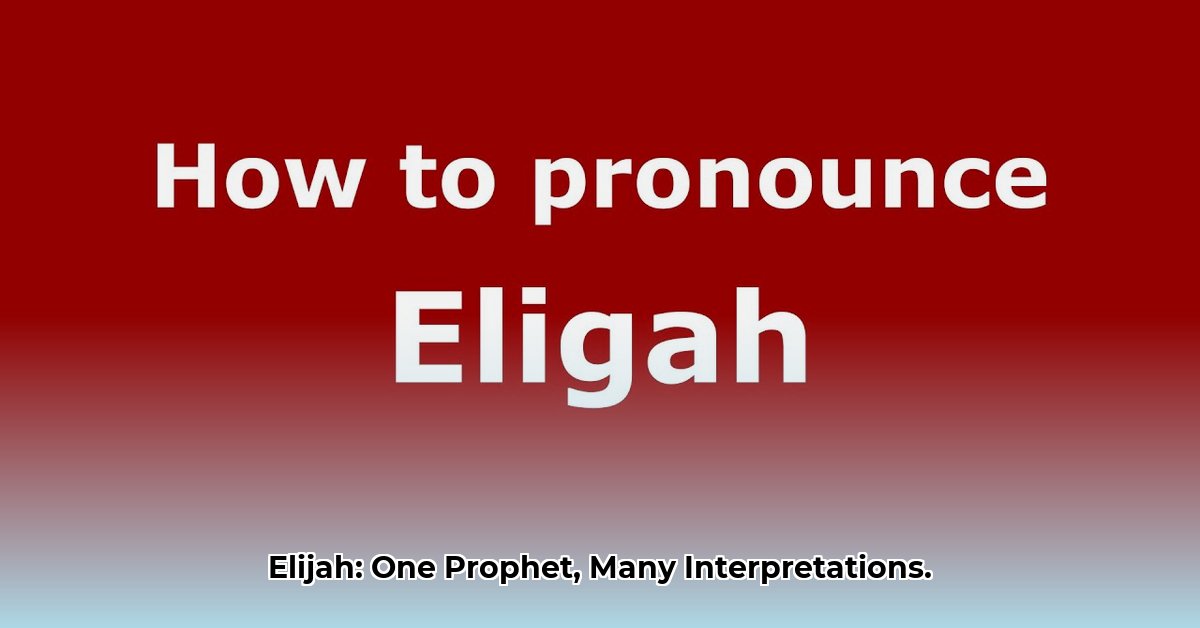
Elijah: A Multi-Faith Perspective
Elijah! The very name evokes dramatic confrontations, miraculous interventions, and unwavering faith. But who was Elijah, and how do Judaism, Christianity, and Islam perceive this compelling figure? This comparative study explores his narrative across these Abrahamic faiths, highlighting both commonalities and unique interpretations. Do the differences in portrayal reflect distinct theological priorities, or do they ultimately reveal a shared understanding of prophetic authority?
Elijah in Judaism: Champion of Monotheism
In Jewish tradition, Elijah transcends mere historical figure; he's a legendary prophet, a staunch defender of monotheism. The iconic showdown on Mount Carmel, vividly described in 1 Kings 18, serves as a cornerstone of Jewish narrative. Elijah's courageous defiance of Baal's prophets, culminating in a dramatic display of God's power, exemplifies unwavering faith and resolute opposition to idolatry. This narrative underscores the importance of steadfast devotion to one God. His legacy endures in rituals like the Passover Seder, where an empty cup is reserved for him, symbolizing the hope for the Messiah's arrival. He represents unwavering faith and the enduring promise of redemption. How does this image of Elijah resonate with contemporary Jewish identity?
Elijah in Christianity: Precursor and Paradigm
For Christians, Elijah's narrative takes on added significance as a precursor to John the Baptist. Both figures are portrayed as fearless prophets who challenged established power structures, preparing the way for radical religious transformation. The striking parallels between these two figures – their boldness, unwavering commitment to their beliefs, and their roles as harbingers of a new era – are unmistakable. The Gospel accounts of Jesus' transfiguration further solidify this connection. The unexpected appearance of Moses and Elijah alongside Jesus emphasizes the continuity between the Old and New Testaments, underlining Elijah's lasting influence on Christian theology. What aspects of Elijah's life and actions foreshadow the ministry of John the Baptist and Jesus Christ?
Elijah in Islam: The Prophet Ilyas
In Islam, Elijah, known as Ilyas (إلياس), is also revered as a prophet. Although the Quranic account is briefer than the biblical narratives, Ilyas's unwavering devotion to God and his righteous life remain central themes. Islamic traditions highlight Ilyas' role in upholding tawhid (the oneness of God), a cornerstone of Islamic belief. The consistent emphasis on monotheism across these Abrahamic faiths reveals a powerful connection binding seemingly diverse religious traditions. How does the Islamic portrayal of Ilyas contribute to a broader understanding of prophetic figures within the faith?
Comparing Elijah: Similarities and Divergences
A striking similarity emerges across these faiths: Elijah is consistently credited with miraculous feats—raising the dead, summoning fire from heaven, and ending devastating droughts. His dramatic confrontation with Baal's prophets powerfully symbolizes the unwavering commitment to monotheism. However, the details and theological interpretations differ significantly. The Hebrew Bible offers a more detailed account of Elijah's life, while the Quran provides a more concise narrative. These variations reflect each tradition's unique priorities and theological frameworks. This diversity, however, enriches the overall narrative, providing multiple lenses through which to understand a single, compelling figure. How do these varied accounts reflect the differing contexts and theological objectives of their creation?
Elijah's Enduring Legacy: Timely Lessons
Elijah's narrative transcends simple historical recounting; it is a potent symbol. He embodies unwavering faith in the face of adversity, courage in challenging injustice, and unwavering commitment to deeply held beliefs. This resonates across faiths and centuries, inspiring reflection on faith, morality, and the essence of prophecy. His story continues to provoke debate and spark fresh interpretations, ensuring his continued relevance. What aspects of Elijah's life and character continue to hold significance for people today?
Further Exploration: Unresolved Questions
Many intriguing questions remain. For instance, Malachi's prophecy concerning Elijah's return continues to fascinate scholars. Understanding the varied interpretations of this prophecy within each faith tradition reveals much about their unique perspectives on eschatology and the arrival of messianic or significant figures. Ongoing research into these interpretations promises to yield further insights into the ancient texts and their profound implications. What are the key areas of ongoing scholarly debate surrounding Elijah's legacy and prophecies related to his return?
Key Takeaways:
- Elijah's narrative demonstrates the power of faith and commitment to one's beliefs.
- His portrayal across faiths reveals both shared values and unique theological interpretations.
- The ongoing study of Elijah's story offers valuable insights into the commonalities and divergences of Abrahamic traditions.